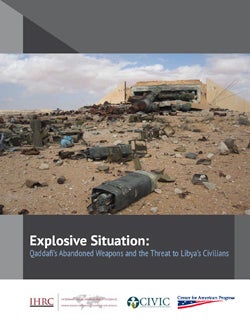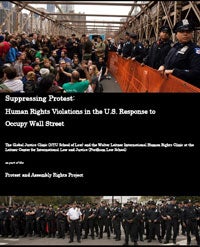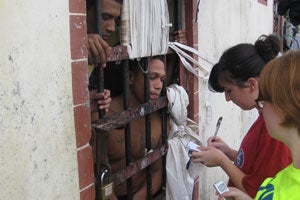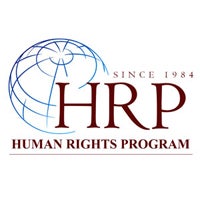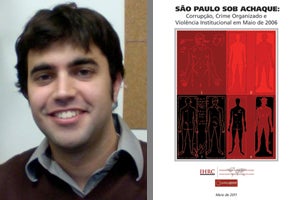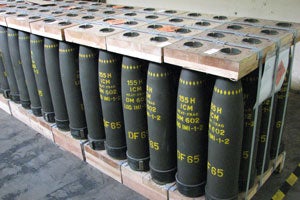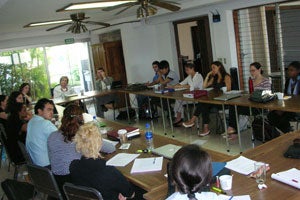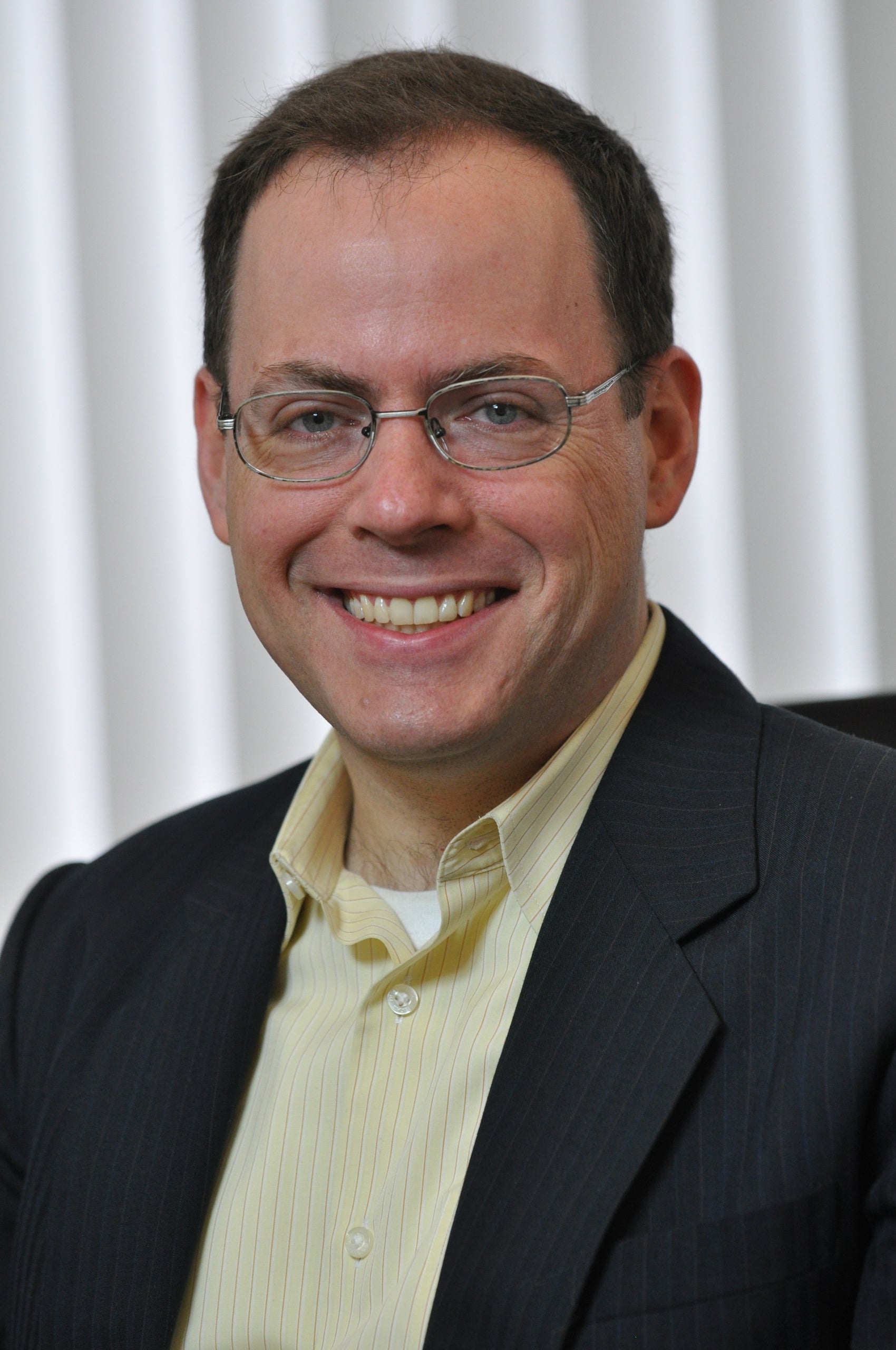Clinics & SPOs
International Human Rights Clinic
-
A Question of Accountability
October 1, 2012
In a Supreme Court case, the International Human Rights Clinic argues that the Alien Tort Statute applies to corporations.
-
Tyler Giannini, Clinical Professor of Law, and Gerald L. Neuman ’80, J. Sinclair Armstrong Professor of International, Foreign and Comparative Law, have been appointed co-directors of the Human Rights Program (HRP) at Harvard Law School.
-
IHRC report finds Qaddafi’s weapons pose threat to civilians
August 6, 2012
Abandoned weapons that were once part of Muammar Qaddafi’s vast arsenal threaten civilian lives in Libya, according to a report released Aug 2 by Harvard Law School’s International Human Rights Clinic (IHRC), in partnership with CIVIC and the Center for American Progress.
-
Harvard Law School’s International Human Rights Clinic has co-released a report documenting the Namibian health care system’s maltreatment of women living with HIV. A joint product of the clinic, the Namibian Women’s Health Network and Northeastern Law School, the 49-page report, entitled “At the Hospital There Are No Human Rights,” was released on July 26 during the International AIDS Conference, in Washington, D.C.
-
Protest and Assembly Rights Project releases report on human rights violations during Occupy Wall Street
July 26, 2012
Under the leadership of Harvard Law School Clinical Instructor Deborah Popowski, HLS’s International Human Rights Clinic is participating in the Protest and Assembly Rights Project, formed in January 2012. On July 25, the first report in the Protest and Assembly Rights Project series was released, calling on New York City authorities to stop the pattern of abusive policing of Occupy Wall Street protests.
-
There she stood, in northern Libya, a spread of explosive weapons before her: mortars and rockets and surface-to-air missiles almost 20 feet long. For all her work in post-conflict zones, senior clinical instructor Bonnie Docherty ’01 had never seen anything like it. The weapons stretched on for miles. It was March, five months after the revolution had ended, and Docherty was supervising a team from the International Human Rights Clinic on a trip to assess the humanitarian risks of abandoned weapons. As the team traveled from city to city, the scale of the problem was startling.
-
Student produces documentary on citrus workers
April 25, 2012
Last fall, the Harvard Law Documentary Studio offered Lauren Estévez ’13 and four other students the training, funding and equipment they needed to make a short documentary film. It was a challenge, fitting filmmaking into law school. But after months of research, shooting, and editing, Estévez’s 12-minute film about the lives of citrus workers in Florida screened this month at the Harvard Film Archive, part of the Studio’s first annual DOC Festival.
-
Spring Break 2012: Where in the world were HLS Students?
April 19, 2012
During the third week in March, a number of Harvard Law students traveled around the world and to remote areas in the U.S. to offer their legal services. With funding from the Office of Clinical and Pro Bono Programs, teams of students worked with farmers in the Mississippi Delta, immigrants in Alabama and patients living with HIV/AIDS in New Orleans.
-
Susan Farbstein, a leading practitioner in the field of human rights, has been appointed assistant clinical professor of law and co-director of the International Human Rights Clinic at Harvard Law School.
-
Clinic files amicus curiae brief with U.S. Supreme Court on behalf of legal historians and scholars
January 5, 2012
In December, Harvard Law School’s International Human Rights Clinic submitted an amicus curiae brief to the U.S. Supreme Court in support of petitioners in a major Alien Tort Statute (“ATS”) case, Kiobel v. Royal Dutch Petroleum Co. The brief in Kiobel v. Royal Dutch Petroleum Co. argues that corporations can be held liable for violations of the law of nations under the ATS.
-
On Nov. 25, the Fourth Review Conference of the Convention on Conventional Weapons concluded that it could find no consensus on proposed treaty language that would allow for some use of cluster munitions. The announcement was a major milestone for Harvard Law School’s International Human Rights Clinic, a supporter of the 2008 Convention on Cluster Munitions.
-
HLS Clinic Files UN Complaint on Behalf of Filipina-American Tortured in the Philippines
August 26, 2011
With the help of Harvard Law School's International Human Rights Clinic, Filipina-American Melissa Roxas has filed a submission with the UN Special Rapporteur on Torture seeking justice for the abduction and torture she suffered in the Philippines in 2009.
-
In an Aug. 17 opinion piece in Australia’s National Times, Senior Clinical Instructor Bonnie Docherty '01 urged the Australian Senate to push back against proposed implementation legislation that would blunt the impact of the international ban on cluster munitions.
-
The United Nation’s Committee on the Rights of the Child is currently examining Panama’s record on children’s rights with the help of a report coauthored by Harvard Law School’s International Human Rights Clinic.
-
IHRC files amicus curiae brief with U.S. Supreme Court
June 27, 2011
On June 17, Harvard Law School’s International Human Rights Clinic submitted an amicus curiae brief to the U.S. Supreme Court in support of a petition for certiorari in a major corporate Alien Tort Statute (“ATS”) case, Kiobel v. Royal Dutch Petroleum Co.
-
In 2006, a series of coordinated uprisings in 74 detention centers and attacks on police stations and public buildings left 43 state officials and hundreds of civilians dead and brought São Paulo—South America’s largest city and financial capital—to a standstill. Harvard Law School’s International Human Rights Clinic and the leading Brazilian human rights group Justiça Global have now released a comprehensive study of the attacks.
-
HLS International Human Rights Clinic lobbies for humanitarian restrictions on weapons
April 18, 2011
Last month, Joseph G. Phillips ’12 and Joanne Box LL.M. ’11, students in the HLS International Human Rights Clinic (IHRC), attended a U.N. disarmament conference, where they met with diplomats to urge adoption of stronger international laws regarding the use of incendiary weapons. The students worked under the supervision of HLS Lecturer on Law and Clinical Instructor Bonnie Docherty ’01, who is one of the country’s leading legal experts on cluster munitions and has expanded her work to other disarmament issues, including incendiary weapons.
-
J-term class in Costa Rica immerses students in doctrine and practice of the Inter-American human rights system
March 7, 2011
When HLS Professor Clinical Professor Jim Cavallaro decided there should be "a structured means of studying the broad jurisprudence and practice of the Inter-American system,” he and Stephanie Brewer ’07 created an on-site course in San José, Costa Rica where students can learn the law on the ground from judges, practitioners and stakeholders in the system. This January, the 20 students enrolled in “Doctrine and Practice of the Inter-American Human Rights System” came away with a deeper understanding of that system—plus an immersion in the world of human rights adjudication.
-
Alston receives honorary doctorate, lectures on global justice at Maastricht University
January 26, 2011
Philip Alston, Harvard Law School’s Sidley Austin Visiting Professor of Law, received an honorary doctorate from Maastricht University in the Netherlands on Jan. 20 as part of the university’s 35th anniversary celebration.
-
IHRC releases paper on incendiary weapons; Docherty publishes book on cluster munitions
January 5, 2011
A new paper released by Harvard Law School’s International Human Rights Clinic and Human Rights Watch calls for stronger controls of incendiary weapons, such as white phosphorus.
-
Tyler Giannini appointed as Clinical Professor of Law
November 1, 2010
Tyler Giannini has been appointed as a clinical professor of law at Harvard Law School. He was formerly a lecturer on law at HLS.

